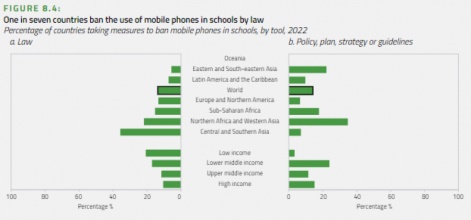United Nations calls for crackdown on mobile app use in schools | Pocket Gamer.biz

UNESCO (The United Nations Educational, Scientific, and Cultural Organisation) has called for countries worldwide to evaluate how smartphones are used in school.

“The digital revolution holds immeasurable potential but, just as warnings have been voiced for how it should be regulated in society, similar attention must be paid to the way it is used in education,” said UNESCO director general Audrey Azoulay. “Its use must be for enhanced learning experiences and for the well-being of students and teachers, not to their detriment.”
Among the issues identified, UNESCO director Manos Antoninis noted the possibility of data leaks in educational technology, as only 16% of countries legally guarantee data privacy in the classroom.
“We know that vast amounts of data are being used without the appropriate regulation, so this data ends up being used for other non-educational purposes, commercial purposes and that’s of course a violation of rights that needs to be regulated,” said Antoninis.
Phoning it in
The report cites several studies that have shown that banning phones can lead to improved academic performance. As such, countries worldwide are taking steps to address the use of phones in school – 13% of countries have laws and 14% have policies in place that ban the use of mobile phones in schools, particularly in central and South Asia.
Despite this, the report argues that there is a merit to technology in the classroom, such as offering technological assistance to students with disabilities. However, there remain significant disparities – the report notes that half a billion students worldwide were cut off from education due to the move to online learning during the pandemic.
There was also a significant divide in the distribution of online resources, favouring North America and Europe. As such, UNESCO is urging countries to clarify their plans on how technology is used in education to ensure that it acts as a tool, without replacing teachers or leaving underprivileged students behind.
pic: Unsplash / Kimberly Farmer
